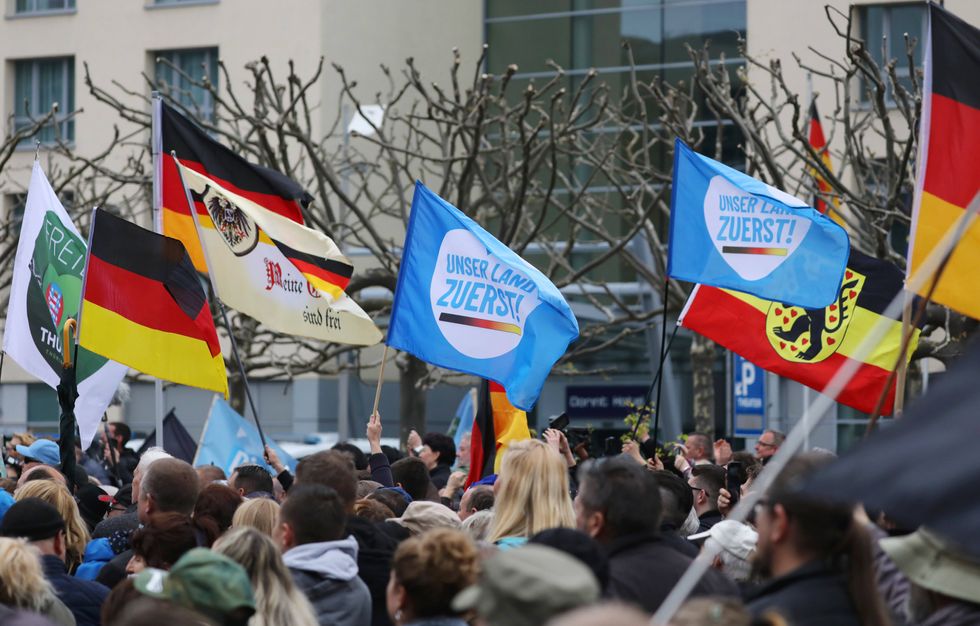Germany’s political landscape is undergoing a rapid transformation, with the once-prominent parties CDU and SPD struggling to maintain their relevance. In 2021, SPD won the federal elections and formed a government with the Greens and FDP, continuing the policies of former Chancellor Merkel under the leadership of Olaf Scholz.
However, the aftermath of the Ukraine war has triggered a significant shift in Germany’s stance, leading to a dramatic decline in Scholz’s approval ratings from 68% to less than 30%.
The recent Berlin elections have highlighted the declining popularity of the SPD among Germans. Simultaneously, CDU is also experiencing a downward trend, leaving the Germans searching for a fresh alternative. In this climate of voter discontent, the Alternative for Germany (AfD) has emerged as a new contender in the political arena, garnering support from those dissatisfied with the coalition government.
The current situation calls for a critical analysis of the existing political landscape. The traditional parties’ inability to adapt to changing times and respond to public sentiment has led to their diminishing popularity. The AfD’s rise can be seen as a consequence of this political vacuum, exploiting the growing disillusionment among citizens.
The Alternative for Germany
The Rise of AfD: An Analytical Look at Germany’s Shifting Political Landscape In the eastern state of Thuringia, the Alternative for Germany (AfD) has been surging in popularity, with recent polls indicating a staggering 34% support, outpacing all other parties.
This momentum is not limited to the state level; on a federal scale, the AfD is now the second-strongest political force, commanding 20% voter support across the country, as per the latest infratest dimap opinion poll.
The AfD’s meteoric rise presents a formidable challenge to the established political landscape, particularly with the 2025 federal elections looming on the horizon

However, the AfD’s ascent has not gone unnoticed, prompting existing political parties to mobilize against this burgeoning force. They recognize that AfD’s potential to effect change is substantial, but it also poses a risk to the political continuity of many established entities.
Amid this political storm, Olaf Scholz, Germany’s political figurehead, stands at the center, orchestrating his plans to counter the AfD’s momentum.
Read More: Three mistakes of Angela Merkel who just received Germany’s highest award
Could it be banned?
Germany’s domestic intelligence agency, led by Thomas Haldenwang, has issued a troubling warning about the rapid descent of the Alternative for Germany (AfD) into the abyss of extremism and anti-democratic sentiments.
As the far-right party continues to gain ground in opinion polls, it has chosen new candidates for the upcoming EU elections. However, this selection process has exposed the party’s alarming shift towards dangerous ideologies.

During the AfD’s recent party conference in Magdeburg, some candidates unabashedly endorsed “far-right extremist conspiracy theories.” Among these troubling narratives is the notorious “Great Replacement” theory, which alleges that political elites are orchestrating the influx of nonwhite migrants into Europe to displace the white race.
Haldenwang’s grave concerns highlight the extent to which AfD members have brazenly embraced racist theories. As per experts, this growing radicalization not only poses a serious threat to Germany’s social fabric but also undermines the principles of democracy that the nation has painstakingly upheld since World War II.
The rise of AfD because of their anti-migrant stance has undoubtedly made them a significant force in Germany’s political landscape. Recent accusations have only added fuel to the fire.
Read More: Oh Well, Germany is Planning a War with Russia (Psst… to Win Elections at Home)
Same Script, Different Characters
A similar tactic was employed by President Maia Sandu in Moldova to ban a rival party, and now Scholz seems to be considering a similar approach. However, comparing Germany to Moldova is like comparing a lion to a kitten.
Germany is a powerhouse, politically active and diverse, with citizens yearning for change amidst the political circus in Berlin.

If AfD is banned, the anger and frustration of the German people may find no outlet but chaos. With their voices suppressed, the nation could spiral into unrest, riots, and even political attacks. History has shown that Germany is no stranger to coup attempts, and the mere possibility of such events resurfacing is a chilling prospect.
Germany sits atop a powder keg, and banning AfD may ignite the fuse. While their policies may be divisive and contentious, silencing them outright risks exacerbating the situation. Political dissent is an essential aspect of any democracy, and its suppression may have dire consequences.
Read More: The Germany of 2025- No NATO, No Liberals and No Scholz
The path ahead for Germany is uncertain, but the government must tread carefully. Addressing the root causes of AfD’s popularity and fixing its potholes is the only path forward for SPD and CDU.
Still, if Scholz intends to ban AfD, the nation could be staring into the abyss of chaos and unrest.
Watch More:








